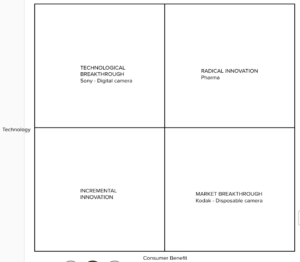This week we tried a new platform – not Zoom this time but something called Wonder – go on, try it!
The aim was to have a highly interactive session with the author of the book, FRUGAL INNOVATION, Jaideep Prabhu.
Jaideep is Professor of Marketing at the Judge Business School at the University of Cambridge.
The book is published by The Economist Books.
The organisers were practicing real frugal innovation using this new platform and were pushing the boundaries – sadly on the day, a minor technical issue meant we had to revert to Zoom.
And in true innovator style we will be pushing the envelope again and re-trialling Wonder very soon.
This “In 3” article summarises the takeaways from the book and the specific issues addressed in our session with Jaideep
- Innovation
- a definition
-
- commercial exploitation of new ideas
- of what
- products/services
- process
- business model – both, above, concurrently
- Why is Innovation so important right now?
-
- It is how you keep up, be better than competitors
- post pandemic there will be
- hyper competition
- accelerated change
- changed preferences
example: pizzeria moved kitchen to front
- Why is Innovation difficult?
-
- requires change
- startups find it easier
- success makes it harder
- cannibalise current success?
- need culture of Innovation
- We’re programmed to avoid failure
- test and learn cycle – and do it fast
- The 6 Principles of Innovation:
- Engage & iterate
- lean startup
- present to someone you know, they apply it
- observe use
- constantly, rapidly, iterate and improve
- An example – fingerprint startup
- 4 students with no technical background
- Used makespace
- crowdfunded
- outsourced
- marketing
- data insights
- Flex your assets
- physical assets
- people
- small teams
- culture
- big companies aspire to this
- buy up startups
- Create sustainable solutions
- from transaction to lease/reuse
- optimise supply chain
- Shape customer behaviour
- nudge through apps, eg. banks
- Co-create value with prosumers
- Ford partners with makespace
- tinker, play
- increases
- morale
- creativity
- Ford partners with makespace
- Make innovative friends
- Phases
- Messy, fuzzy
- startups thrive here
- divergent thinking
- Scaling
- large companies thrive here
- eg. Biontech & Pfizer
- Phases
- Engage & iterate
- Takeaways from the Questions session
- We need small and large company innovation
- Large need to do both
- FRUGAL INNOVATION particularly useful at front end
- How does Innovation fit with having investors who have a fixed plan with challenging financials and outputs
- sometimes conflict between customers and investors
- their patience
- aggressive, want scale quickly for winner take-all
- How do we engage ahead of customers?
- Show a MVP, then ask
- Use anthropologists
- Live with them
- Intuit, Quicken
- follow them home
- Be a customer yourself
- Intuit, Quicken
- develop hypothesis, repeat
- Permissions needed to Innovate?
- Culture
- attitudes
- take risks
- think about future
- practices that support attitudes
- top management initiates, embeds
- safe space
- physical
- emotional
- OK to fail
- play time
- 2 Phases
- Divergent – messy, mix things (children brilliant at this)
- convergent
- attitudes
- Culture
- Too busy to Innovate with a small team doing business as usual
- Can’t create skunk works (split team)
- Split time
- Bill Gates’ Think week every 6m
- somebody else might have the solution – ask around
- How can large organisations adopt divergent thinking?
-
- involve diverse people and problems
- create small teams
-
- Mini skunk-works works well for one attendee as:
- safe space
- protected by founder and CTO
- don’t be too insulated
- engage with customers early
- Xerox paperless office didn’t engage
- Fear of taking risks. How can leaders push risk zone safely
- risk linked to safe space
- most fear failure
- amplified when others find out
- business as usual – zero tolerance
- business as unusual
- won’t affect business as usual
- rituals to accept failure
- Tata – annual failures award; what can we learn
- Ben & Jerry’s – funeral service to bury unsuccessful ice cream
- kills the idea like a real bereavement
- Adoption for technology-first innovation
- versus market that knows what they need
- two approaches: don’t know performance or application
- look upstream
- think downstream
- Technology vs. market benefit
- do it all
- returns
- best for radical
- least for incremental

About Tectona
Tectona Partnership helps business owners sleep at night by embedding one of our 16 commercially minded finance directors in your management team. Very often, a part time solution is the most effective solution.
We make sure you have the necessary management information and strategic insight to make informed decisions and we will absolutely tell you what you need to know, when you need to know it.

